Witchcraft, Magic, and Religion in Seventeenth-Century Massachusetts
Autor Richard Weismanen Limba Engleză Paperback – 18 iul 1985
The Salem witchcraft persecutions are one of the most well-known events in history, but there is more to the story. In this book, Weisman explores the social, political, and religious implications of witchcraft. He ventures outside of the usual studies of the Salem trials to provide a comprehensive understanding of 17th-century Massachusetts witchcraft as a whole. In the first section, an attempt is made to explicate the logic and meaning of the two major interpretive frameworks of witchcraft in terms of which the category was understood by inhabitants of Massachusetts Bay. The second and third sections of this study deal with the sources of support and resistance to collective actions against witchcraft prior to the Salem trials and during the Salem trials respectively.
Preț: 198.81 lei
Nou
Puncte Express: 298
Preț estimativ în valută:
38.05€ • 41.35$ • 31.99£
38.05€ • 41.35$ • 31.99£
Carte indisponibilă temporar
Doresc să fiu notificat când acest titlu va fi disponibil:
Se trimite...
Preluare comenzi: 021 569.72.76
Specificații
ISBN-13: 9780870234941
ISBN-10: 0870234943
Pagini: 288
Dimensiuni: 147 x 227 x 23 mm
Greutate: 0.4 kg
Ediția:First Edition
Editura: University of Massachusetts Press
Colecția University of Massachusetts Press
ISBN-10: 0870234943
Pagini: 288
Dimensiuni: 147 x 227 x 23 mm
Greutate: 0.4 kg
Ediția:First Edition
Editura: University of Massachusetts Press
Colecția University of Massachusetts Press
Notă biografică
Richard Weisman is professor emeritus at York University.
Recenzii
"Promises to change the terms of the debate about the Salem witch trials."—New England Quarterly
"In the Massachusetts Bay Colony, the devil was a codefendant in virtually all criminal indictments and witches were his agents. But [Weisman] argues that the people accused of being witches didn't start the trouble. Rather, they were caught up in a conflict generated by angry villagers, insecure clergymen, and litigious magistrates, whose interests were served by persecuting witches. . . . In this intriguing book, Mr. Weisman succeeds in explaining the complex interaction of religion, government, and popular feeling that led to the execution of twenty people at Salem."—New York Times Book Review
"In both substance and interpretation, Richard Weisman has contributed significantly to our understanding of a most complex phenomenon. . . . This is an important book that succeeds in placing Massachusetts witchlore within the contexts both of the region's general history and of recent scholarship on European witchcraft."—Journal of American History
"An intriguing assessment of the local episodes which reveal dependence on the invisible world. [The] work is interdisciplinary, gracefully presented, well documented, and should interest colonialists, legal historians, and students of early American religion."—American Studies
"Weisman has conducted an excellent review of the historical and social conditions which dominated the witchcraft persecutions and of the role religion played in this enlarged framework. Strong research, helpful appendices, and the ease of his writing style make this a good textbook and an essential secondary source."—Studies in Religion
"In the Massachusetts Bay Colony, the devil was a codefendant in virtually all criminal indictments and witches were his agents. But [Weisman] argues that the people accused of being witches didn't start the trouble. Rather, they were caught up in a conflict generated by angry villagers, insecure clergymen, and litigious magistrates, whose interests were served by persecuting witches. . . . In this intriguing book, Mr. Weisman succeeds in explaining the complex interaction of religion, government, and popular feeling that led to the execution of twenty people at Salem."—New York Times Book Review
"In both substance and interpretation, Richard Weisman has contributed significantly to our understanding of a most complex phenomenon. . . . This is an important book that succeeds in placing Massachusetts witchlore within the contexts both of the region's general history and of recent scholarship on European witchcraft."—Journal of American History
"An intriguing assessment of the local episodes which reveal dependence on the invisible world. [The] work is interdisciplinary, gracefully presented, well documented, and should interest colonialists, legal historians, and students of early American religion."—American Studies
"Weisman has conducted an excellent review of the historical and social conditions which dominated the witchcraft persecutions and of the role religion played in this enlarged framework. Strong research, helpful appendices, and the ease of his writing style make this a good textbook and an essential secondary source."—Studies in Religion
